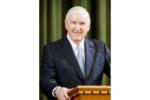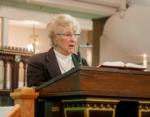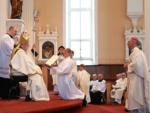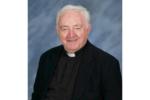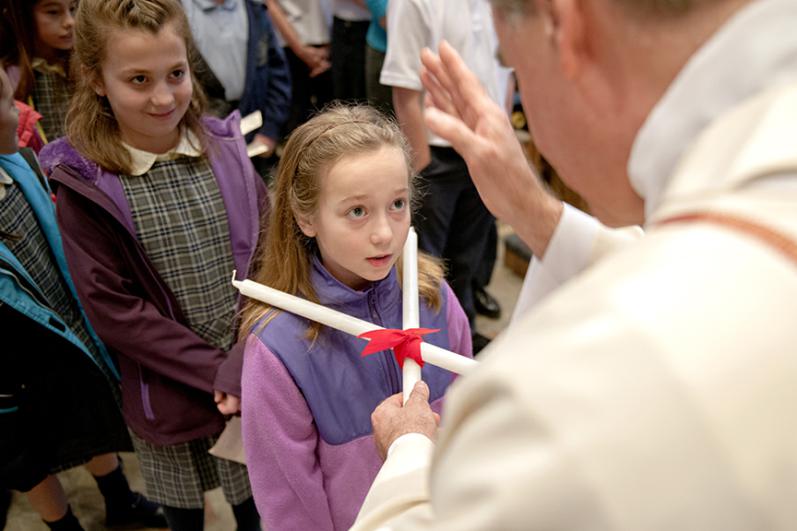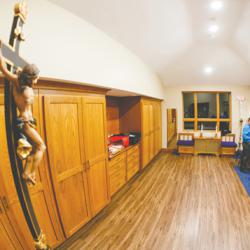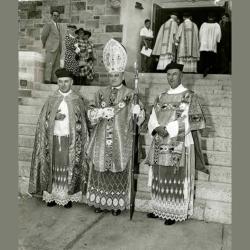Blessings are in the news
Every once in a while, gems of the church's liturgical life are hidden away and not much noticed. Then something happens to bring it out of hiding and get noticed. Recently, this has happened with blessings of persons.
There is a very large book; perhaps a copy is in the sacristy of your parish church. In my office, I have the "blue version" of over 800 pages, simply titled "Book of Blessings."
There are 250 pages of blessings provided for persons in chapters one through nine. There are other blessings of persons spread throughout the book -- blessings for mothers on Mother's Day and for fathers on Father's Day; blessings for new readers and other ministers of the liturgy. If your favorite priest is named a monsignor, there is a blessing for him -- chapter 68.
Also included in this category, though in a completely separate book, are exorcisms. There are two kinds of exorcisms, those contained in the Order for Christian Initiation of Adults celebrated at the Scrutinies in your parish church during the Lenten season or at the celebration of Baptism. What the church prays for in an exorcism is the release of the one being held in the power of sin and the devil. Because a degree of publicity can often be drawn to such a reality, the church carefully determines the particular situation before she would permit the use of the rite in that book.
Last week, a mention was made about more solemn celebrations of persons. This week, we can rely on the table of contents of the "Book of Blessings" to see when, where, and how blessings of persons happen.
First, a bit of the why.
A blessing is what, in general terms, a sacramental is. Right away, we think of sacramentals as things -- statues, scapulars, medals -- and next week, we'll look at those blessings. A blessing can make a thing a sacramental, but a blessing can itself be a sacramental.
"The Book of Blessings" has a 10-page introduction that places the whole idea of blessings in the context of their origin in both the Old and the New Testaments, their importance for Israel and the church, and so for us.
This weekend, we have an interesting merger of the blessing of things and persons. On Feb. 2, we have the annual blessing of candles at Mass for the Feast of the Purification of the Lord; the next day follows with the Memorial of St. Blasé and the Blessing of Throats, customarily using the candles blessed the day before.
Although the "Book of Blessings" provides many blessings, recall that blessings of both persons and things may be found in other liturgical books.
In addition to the extraordinary privilege of assembling for Mass on Sunday, and for some even daily, we are sent from Mass with the Trinitarian Blessing or one of the many blessings provided in the Roman Missal. During Lent, a special prayer over the people at the end of Mass is provided for every Mass.
There is a lovely three-part solemn blessing at the end of the celebration of Baptism -- blessing first the mother, then the father, then all of those present.
There are also blessings for persons at other celebrations of sacraments, both within and outside of Mass.
Blessings of persons can serve as a reminder of the sacredness of the human person -- loved into existence by God, sustained in life by God, and destined for eternal life with God. Listening carefully to the blessings we receive as given in the liturgical books can teach us how this truth is emphasized in the faith of the church celebrated in her worship.
The great sacramental principle based on the incarnational principle shines forth in blessings. That is that God in Christ uses people and things to tell us about himself. This is where we have much in common with our Jewish sisters and brothers. From the beginning, God saw that his creation was good, and when it came to us humans, very good.
Because God finally spoke to us in the person of his son Jesus Christ and so provides the perfect pattern of what we human beings are for God and with one another; we speak of the incarnational principle.
Because God's creation is good, and indeed very good, he continues to use aspects of this creation to speak of his enduring presence; this is the sacramental principle.
Next week, we'll look at the blessings of things.





